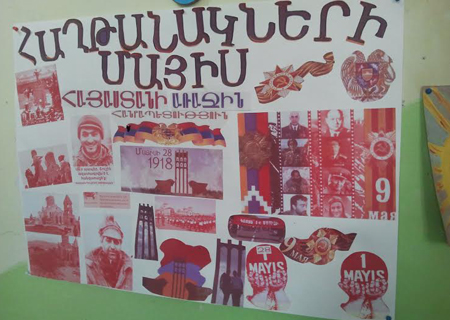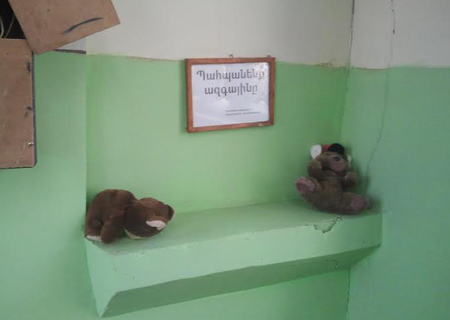On June 1, our kindergarten class was usually taken to a nearby church. No one would even ask me whether I wanted to go to church or not. Only later did I understand that taking kids to church on the international day for children's protection was probably their way of “protecting” us. They'd make me learn poems and songs for recitals, and no one would even care to find out whether I liked them or not. I didn't understand why I had to announce during my graduation ceremony that nannies had taken as good a care of us as our mothers would have, or why I was made to proclaim my motherland and its cloudless skies… They'd make us recite poems with as much expression and emotion as possible: we practically had to shout them to the audience.
Below are reflections of several of my Facebook friends on their kindergarten experience; whether they enjoyed it or not. If so, why? If not, why not?
– The feeling I remember most prominently is boredom; we were doing the same thing over and over again – eat, line up, sleep, eat again… I used to love the little animal-shaped cookies, and I still think of kindergarten when I come across them in daily life. But there was also bread with jam they used to shove into our mouths for some reason…
– The positive [thing about kindergarten] was farina that my tablemates refused to eat, leaving me with extra helpings.
– I have mainly bad memories of that time, connected mostly with the total demand for sleeping and my total inability to. Hence, spending those two hours just lying in bed awake was like daily torture to me. Because time goes by especially slowly for children. Then there were the recitals and my lack of desire to take part in them. As a result, I'd get some minor roles, which was even worse than not participating at all.
– I was freshly in kindergarten; food had been laid out, everyone was sitting at the tables, but no one would touch their meal. Then the nanny, who was standing with her back to us facing the window, muttered something under her breath, and the kids began eating. The same thing would repeat every day, and I'd try to understand the words that signalled everyone to eat. Much later I somehow managed to hear that she was saying “bari akhorzhak” [“bon appetit;” the literal translation of the Armenian phrase would read “kind appetite”]. For a long time after that, I still, for the love of me, could not figure out what the phrase meant and how appetite could be “kind.”
– I'm a product of nursery, and perhaps that's why I have such high resistance levels. Adaptation to life took place in a collective and often by way of instructions. For example, instruction number one: when I eat, I am deaf and dumb! And I'd eat whatever meal was in front of me without asking questions. Instruction number two: sleep time, to beds! I had to go to bed, even if I didn't want to sleep. I'd even pretend to be asleep to be left alone. Every adaptation has elements of violent subjection and control, so I went through my first socialization process in kindergarten.
– I remember a booklet – with the picture of Gevorg Chavush on it, as I recall – of patriotic songs that we had to learn.
– I hated sleeping, but they'd make me go to bed. I still remember the smell of the tasty food nannies would eat after putting us to bed…
– We were made to go to bed at specific times, and those who didn't want to would be punished. I never slept, so I stood in a corner for about 10 minutes almost every day. They'd make us eat strange meals with a disgusting smell, and if anyone dared to complain, [nannies] would humiliate them in front of everyone, say they'd pour their meals over their heads, etc…
Kids would be sent to kindergarten sick and would infect everyone, but no one would tell the parents to keep them at home.
Problems at home directly affected the nannies' moods. They also had favourites among the kids and took better care of them, actively ignoring the rest. My parents were never able to come to recitals because of 9-6 workdays, while others came with flowers and gifts, which always caused me great discomfort.
– What positives? The only positive thing about kindergarten was the graduation ceremony, aka my last day there.
– I went to kindergarten for only two months, after which I told my parents I had already graduated and there was no more need to take me there. It was a terrible place; they'd put us in corners and not let us play with the toys; they'd make us eat disgusting meals; they wouldn't even allow us to go pee before bed. In short, it was a nightmare.
– I loved kindergarten, and kindergarten loved me back. Looking back, I realize that it was because I had been fully integrated into their discipline, that is, I never refused to sleep, was an eager singer and a dancer.
– My classmate Anna's parents used to film the performances on a camera because they owned a store and were rich. I have yet to see any footage since Anna's mother would always say that there was only one copy and it would wear out if watched often. Not that it matters 'cause they'd keep the camera only on their daughter throughout the whole thing.
– I hated having to learn patriotic songs… I never liked learning stuff by heart, but songs about dying, about sacrificing one's life were especially incomprehensible to me. I didn't understand why we had to learn such sad militaristic songs.
– There were toys that everyone was free to play with. But children of rich parents would bring their own toys with them. Toys that not everyone could afford to buy…
One day, having eaten yet another plate of cold pea soup in kindergarten, I puked on a pair of shoes in front of our house. And that was the last time I ever went to kindergarten: my parents refused to (or I made them to) take me to kindergarten ever again. To date, I still despise peas…
Article prepared by Shahane Khachatryan
 Epress.am News from Armenia
Epress.am News from Armenia


